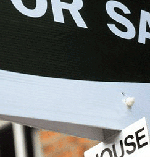Are agent fees negotiable?
For those planning to launch their property in the new year, Cheryl Markosky gives some tips on tackling agents’ fees and valuations in the current market


Exquisite houses, the beauty of Nature, and how to get the most from your life, straight to your inbox.
You are now subscribed
Your newsletter sign-up was successful
With the credit crunch (la crise, as the French charmingly call it) upon us, prices tumbling and agents selling fewer properties, you would think now is a good time to negotiate on the fee you pay your estate agent. Yet the answer is no.
Major agencies have been putting their fees up by an average of 0.25% over the past eight months, citing the view that any fool can sell in a boom, but vendors need to pay a reputable agent more for hard work in a difficult market.
Peter Bolton King, chief executive of the National Association of Estate Agents, says that, as property transactions this year are predicted to be 60% down on 2007, agents are justified in demanding higher fees to turn a profit.
‘Sellers need a good agent who makes the sale and also negotiates extras, hopefully covering the fee.’ As well as wanting a bigger slice, agents are getting pickier about what property they take on in the first place.
Peter Young, managing director of John D. Wood & Co, believes the key factor is the commitment of the vendor. ‘Is the asking price realistic and are the fees worthwhile? If the property is £300,000, a fee of less than 2.5% is not on.
But if the property is valued at £1 million plus, I might go down to 2%-2.25%, depending on who pays marketing costs.’ This compares to fees in a stronger market being trimmed to 1%–1.5%. However, despite ‘official’ claims, agents are willing to lower a fee on a sellable property, believes Ed Mead from Douglas & Gordon in London.
‘A property that ticks the right boxes is attractive in this market, and agents will reduce fees to secure the instruction.’ When choosing an agent, don’t accept sweeping claims. ‘Ask to see a list of buyers. A good agent should show your house to 300–400 active buyers,’ adds Mr Mead.
Exquisite houses, the beauty of Nature, and how to get the most from your life, straight to your inbox.
What is your house worth?
Valuing a property in the current market is becoming a tricky business. The favoured method of comparables seeing what similar homes sold for in your area a few months earlier no longer stands up. ‘With a home losing about 2% of its value every month, the comparable price is out-of-date, even if similar houses were sold only three months ago,’ argues David Adams, head of residential at Humberts.
An experienced agent going with his gut feeling, knowing the buyers well and understanding how much they will pay is more important these days than contrasting tired property prices. A good agent will put an accurate price on a home, but a poor one will look at what it sold for three months ago and add a bit on top.
‘That’s why about half the properties currently on the market are over-priced,’ reckons Mr Adams. Also, beware of agents offering to pay for the Home Information Pack (HIP), now required by law when you market a property. ‘You want to own it yourself,’ insists Mr Adams. ‘Otherwise, if you sack the agent and want to take the HIP with you, you’ll have to get it redone, which will cost about £200 and a great deal of effort.’
These days, most agents are asking for costs upfront to cover the HIP, advertising in papers and magazines and the printing of the brochure. In these straitened times, when agents only have about a 50% chance of selling your property, such a request appears to be wholly legitimate.
Country Life is unlike any other magazine: the only glossy weekly on the newsstand and the only magazine that has been guest-edited by His Majesty The King not once, but twice. It is a celebration of modern rural life and all its diverse joys and pleasures — that was first published in Queen Victoria's Diamond Jubilee year. Our eclectic mixture of witty and informative content — from the most up-to-date property news and commentary and a coveted glimpse inside some of the UK's best houses and gardens, to gardening, the arts and interior design, written by experts in their field — still cannot be found in print or online, anywhere else.

